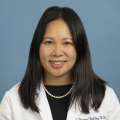On July 1 of last year, the David Geffen School of Medicine at UCLA launched a fellowship to address LGBTQ+ health care needs and inequities, areas that often are overlooked in medical school and residency training.
The program provides the fellow with an immersive experience in LGBTQ+ health and wellness, including sexual and behavioral health, transgender care and hormone management, and gender affirming surgery.
Looking back, faculty members and the incoming and outgoing fellows reflected on the program’s first year.
The LGBTQ+ fellowship program is comprised of four pillars with clinical care, advocacy, research and educational components, said Dr. Emery Chang, an internal medicine and pediatrics doctor focusing on HIV and primary care.
“I spent most of my time with the fellow at the HIV center at the UCLA CARE clinic in Century City,” he said. “It’s a clinic that’s been around since the very early days of HIV/AIDS so the history is very long and rich. We do clinical research and specialty care. The clinical experience comes from people that have either been just newly diagnosed or are in established care.”
Dr. Chang, like others, said much of the changes coming to the program are being shaped by feedback from the first fellow.
“One of the things that I learned over this past year is that, with a new program of this stature, there really are no specific objectives and guidelines in play to guide you,” said fellowship co-director Dr. George Yen, an assistant professor of internal medicine. “It gave us a lot of flexibility to do what we wanted to do, but it was also challenging in the sense that things might not have gone exactly as planned.”
Specifically, Dr. Yen said that some of the learning sites proved to be too far away, leading to a hectic commute, and that the program could use a stronger focus on mental health. The fellowship has since added a clinical experience in addiction medicine that will integrate internal medicine and behavioral health.
Dr. M. Chase Cates, UCLA’s first LGBTQ+ fellow, said the experience was affirming and gave him the confidence he needed to care for members of the LGBTQ+ community.
“The biggest thing that I loved was the Gender Health Program and working with Dr. Amy Weimer,” he said. “This is an area I had no training in and came in not knowing how to do anything. And I saw just how affirming and welcoming the clinic was. It taught me how to go about taking care of transgender and gender diverse patients. It was rewarding for me to see firsthand their lives changing and merging how they felt on the inside with the way they look on the outside.”
Dr. Cates said he was encouraged by how positively faculty and directors of the program received his feedback. Dr. Cates and his husband planned to return to his home state of Texas, where he’ll work in a San Antonio clinic that focuses solely on LGBTQ+ care.
Dr. Felipe Saavedra became the program’s newest fellow on July 1. A native of Chile, Dr. Saavedra moved to the United States in 2015 with his husband to join UCLA’s International Medical Graduate Program. He completed his family medicine residency at UCLA, and hopes to use his bilingual and bicultural skills to build bridges to L.A.’s Hispanic LGBTQ+ community.
“I’m passionate about LGBTQ+ care and HIV prevention and treatment,” Dr. Saavedra said. “I am super grateful that I was selected for this fellowship. I am a strong believer in primary and preventive medicine. And I want to use my knowledge to better serve the LGBTQ+ community.”





